Business Across Cultures- Questions PDF

| Title | Business Across Cultures- Questions |
|---|---|
| Course | Management Interculturel |
| Institution | NEOMA Business School |
| Pages | 3 |
| File Size | 82.2 KB |
| File Type | |
| Total Downloads | 15 |
| Total Views | 137 |
Summary
Business Across Cultures- Questions...
Description
BUSINESS ACROSS CULTURES – INTERCULTURAL NEGOTIATION QUESTIONS
1. TYPES OF CULTURE a. Cultural frontiers: What is your culture organisation ? b. Majority and minority groups: Do you belong to what group? c. The culture of the workplace: How is your ideal of culture in your future company? 2. TIME a. Monochronic and polychromic cultures: What is your way of working? b. Your working life: How you see your future working life? 3. AT WORK What kind of relationships are in your country in the working place? How do you life your working environment? What kind of hierarchies do you have in your company? 4. AFTER WORK What do people after work? What do we talk about? What can’t we talk about? What kind of gifts do you give? What kind of humour in your culture? 5. BODY LANGUAGE How close do you like to be o people when you speak to them? How do you greet colleagues in the morning? Do you have any physical contact with them? Do you smile much? When? Do you use your arms and hands to communicate? What do they say? Do you consciously make eye contact with business partners? When you make a presentation: - what do you do with your hands? - do you stand still or move around? Can you think of other questions to find out about people’s body language? 6. LANGUAGE How many level of language do you know in your culture? Do you belong to a low context culture or to a high context cultures? Are you or not a native speaker and how your react and behaves with somebody that doesn’t speak the language as well as you? One language or several languages? Why? What do you think about doing “business across cultures”? How long?
7. COMMUNICATION A. Presentations. a. Information: How much does the audience want to hear? How much information will they expect in the handouts? b. Seriousness: How formal do I need to be? Will the audience appreciate a joke or two? Can I take off my jacket? Can I make a reference to the audience or not? c. Interaction: Will people in the audience expect only to listen or would they like to play a more active part? Can I expect much audience feedback? B. Meetings: a. Purpose: What will the objective of the meeting be? Will the other participants see it as a chance to discuss/to make decisions/ to inform/ to get to know each other? b. Roles: Will participants expect one person (the chair) to direct and control the meeting, or will everyone have responsibility for its success (as in many brainstorming meetings). c. Process: Should we get down to business immediately or allow some time to get to know each other? Can I expect the meeting to start early/ on time/ late? Should someone take minutes? C. Negotiations: a. Time: How much time must I give to this process? Can I expect a decision during the meeting? b. Roles: Who is the decision-maker? Do they work as a team or individually? c. Tactics: How direct or indirect should I be? How personal or impersonal should I be? 8. BUSINESS FUNCTIONS a. Dominant business functions: What are the backgrounds of the top managers in your company? What types of professional qualification have the highest status? Which functions get paid the most? What fields to ambitious parents want their children to go into? b. Characteristics of business functions: What kind of people are in your company and how do you see them? c. Stakeholder cultures: Which of the qualities in the box above would appeal to these different stakeholders? d. Multi-disciplinary teams: What can be gained from working in a multi-disciplinary team? 9. LEADERSHIP What sort of leader are you? What sort of leader do you prefer? What leadership style do you prefer? 10. DECISION-MAKING Do you like to make decisions during or after a meeting? Do you like to make decisions alone or with other people? Are you a fast or slow decision-maker? Do you like to have a written record of decisions? Do you like to plan for most things or do you leave some things to chance?
Do you belong to a “low cultural context” or to a “high cultural context”....
Similar Free PDFs

Cultures precolombines
- 3 Pages

Classical Cultures Midterm
- 5 Pages

Business Finance Practice Questions
- 25 Pages

Questions Business Economics
- 18 Pages

Education across borders
- 5 Pages
Popular Institutions
- Tinajero National High School - Annex
- Politeknik Caltex Riau
- Yokohama City University
- SGT University
- University of Al-Qadisiyah
- Divine Word College of Vigan
- Techniek College Rotterdam
- Universidade de Santiago
- Universiti Teknologi MARA Cawangan Johor Kampus Pasir Gudang
- Poltekkes Kemenkes Yogyakarta
- Baguio City National High School
- Colegio san marcos
- preparatoria uno
- Centro de Bachillerato Tecnológico Industrial y de Servicios No. 107
- Dalian Maritime University
- Quang Trung Secondary School
- Colegio Tecnológico en Informática
- Corporación Regional de Educación Superior
- Grupo CEDVA
- Dar Al Uloom University
- Centro de Estudios Preuniversitarios de la Universidad Nacional de Ingeniería
- 上智大学
- Aakash International School, Nuna Majara
- San Felipe Neri Catholic School
- Kang Chiao International School - New Taipei City
- Misamis Occidental National High School
- Institución Educativa Escuela Normal Juan Ladrilleros
- Kolehiyo ng Pantukan
- Batanes State College
- Instituto Continental
- Sekolah Menengah Kejuruan Kesehatan Kaltara (Tarakan)
- Colegio de La Inmaculada Concepcion - Cebu










